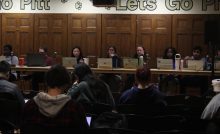Off-campus study abroad cancelled for spring semester, Faculty Assembly announces


History professor John Stoner announced during a Wednesday faculty assembly meeting that the University will cancel all off-campus abroad and away programs for the spring semester.
Pitt is cancelling all off-campus study abroad and away programs for the spring semester, according to a Wednesday afternoon announcement from John Stoner, the co-chair of the University Senate’s educational policies committee.
Pitt’s Faculty Assembly discussed the University’s study abroad plans at Wednesday afternoon’s meeting hosted via Zoom. It also addressed a number of other campus issues including the COVID-19 updates following Halloween weekend and new goals for the health science department and the School of Medicine.
Stoner said he is “cautiously optimistic” that Pitt could offer off-campus programs in the summer, if COVID-19 conditions allow for it. He added that the Study Abroad Office is also working on “high-impact virtual and global internships” in place of traditional study abroad opportunities.
Pitt cancelled all fall and full-year study abroad and study away programs in April because of the COVID-19 pandemic. This followed a University decision in March to cancel all study abroad and study away programs that required air travel due to the pandemic. Many students, faculty and staff were abruptly recalled in March from countries hit hard by the virus.
While the University still remains in the Guarded Risk posture, Chris Bonneau, the president of the University Senate, said there were some indoor house parties and gatherings during the Halloween weekend. The Coronavirus Medical Response Office said in its Tuesday update that it expects to see the number of new COVID-19 cases to rise in the near future due to Halloween gatherings last weekend and potential gatherings related to the election.
The update encouraged students to help keep the spread of COVID-19 on campus under control through mitigation measures like wearing a mask and social distancing.
“COVID-19 mitigation fatigue is real, so we must remain vigilant,” the CMRO update said. “As a university community, we have succeeded in keeping the spread under control. Easing off now could carry serious consequences for our campuses, communities and families.”
Bonneau added that in the aftermath of Halloween weekend, while there were a few occurrences of indoor house parties and incidents of students not wearing masks, most students seemed to have followed the rules. He said this is why Pitt hasn’t seen a significant increase in cases.
“Members of the Pitt community have done an excellent job at adhering to the mitigation measures,” Bonneau said. “While we have experienced some upticks, we have not experienced the case growth seen in Allegheny County.”
Pitt added 18 new COVID-19 cases, composed of 15 students and three employees, between last Friday and Monday. The University has had 373 students and 43 employees test positive since June 26, with 347 students and 35 employees recovered thus far.
Anantha Shekhar, senior vice chancellor for the health sciences and dean of the School of Medicine, also outlined his eight main goals for the health sciences department and School of Medicine that he hopes to achieve by 2025.
Shekhar said his goals include being the top school in research excellence, educational excellence, clinical excellence, translational excellence, community engagement and health justice, faculty growth and leadership development, commercialization and product development and interprofessional education.
He said while there is a lot of outstanding work being done currently by the health science schools, there are areas he wishes to expand in order to achieve new levels of academic excellence.
“We lack a lot more engagement across the health sciences schools, and also a lot more engagement in a variety of other health aspects beyond the research and academics,” Shekhar said. “I think we need to emphasize a more holistic approach in our school.”
Shekhar said he also wants to increase undergraduate and online education curriculum, expand philanthropy efforts to support scholarships and faculty, develop long-term strategies to improve the health science buildings and better engage in global health and international opportunities.
He added that his main goals are to integrate the curriculum throughout the health science schools to create an educational experience that is more reflective of the professional world.
“I think the two layers of integration we need to have is in the educational approach where we have an integrated curriculum with some overlap between all of the six health science schools,” Shekhar said. “Then, the second tier would be to better integrate the faculty and research opportunities through a multidisciplinary system.”
Recent Posts
SGB addresses concerns about ICE presence on campus, hears SJP lawsuit against administration, approves governing code bill
At its weekly meeting on Tuesday at Nordy’s Place, Student Government Board heard concerns about…
ACLU of Pennsylvania sues Pitt over SJP suspension
The ACLU of Pennsylvania filed a federal civil lawsuit against the University of Pittsburgh and…
Marquan Pope: The ultimate shark
One of the most remarkable things about sharks is that an injury doesn’t deter them.…
Who Asked? // Do we really get a summer vacation?
This installment of Who Asked? by staff writer Brynn Murawski mourns the seemingly impossible perfect…
Notes From an Average Girl // Notes from my junior year
In this edition of Notes From an Average Girl, senior staff writer Madeline Milchman reflects…
Meaning at the Movies // The Power of the Movie Theater
In this edition of “Meaning at the Movies,” staff writer Lauren Deaton discusses her love…

